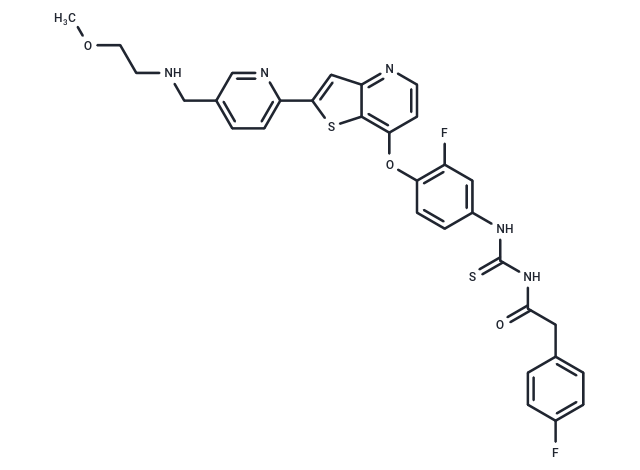Shopping Cart
- Remove All

Your shopping cart is currently empty


| Pack Size | Price | Availability | Quantity |
|---|---|---|---|
| 25 mg | $1,670 | 6-8 weeks | |
| 50 mg | $2,180 | 6-8 weeks | |
| 100 mg | $2,800 | 6-8 weeks |
| Description | Glesatinib is an orally active and potent dual inhibitor of MET/SMO. Glesatinib is also a tyrosine kinase inhibitor. It antagonizes P-glycoprotein mediated multidrug resistance (MDR) in NSCLC. |
| In vitro | Glesatinib hydrochloride (0.01, 0.1, 0.5, 1 μM) obviously enhances by several-fold the percentage of apoptotic cells in NSCLC H1299 cells. Glesatinib hydrochloride (0.01-5 μM; for 72 hours) causes a dose-dependent inhibition of cancer cell growth (IC50: 0.08 μM on NSCLC H1299 cells). Glesatinib hydrochloride has the cytotoxicity to P-gp overexpressing cancer cells KB-C2, SW620/Ad300, HEK293/ABCB1, and their parent cells KB-3-1, SW620, HEK293 cells with the IC50s fell between 5 and 10 μM [1]. Glesatinib hydrochloride (0-40 μM) stimulates the ATPase activity of P-gp transporters in a dose-dependent manner. Glesatinib hydrochloride (1, 3 μM; 120 mins) enhances the intracellular [3H]-Paclitaxel accumulation and inhibits [3H]-Paclitaxel efflux in cancer cell lines overexpressing P-gp [2]. |
| In vivo | Glesatinib hydrochloride (15 mg/kg/day; orally; 40 weeks) results in an obvious reduction in tumor size [1]. |
| Alias | MGCD265 |
| Molecular Weight | 619.7 |
| Formula | C31H27F2N5O3S2 |
| Cas No. | 936694-12-1 |
| Storage | Powder: -20°C for 3 years | In solvent: -80°C for 1 year |

Copyright © 2015-2024 TargetMol Chemicals Inc. All Rights Reserved.